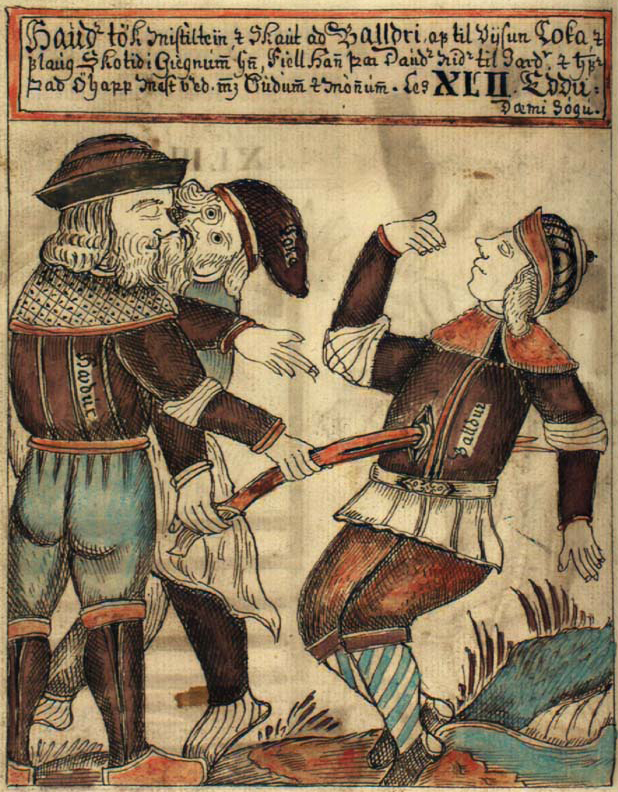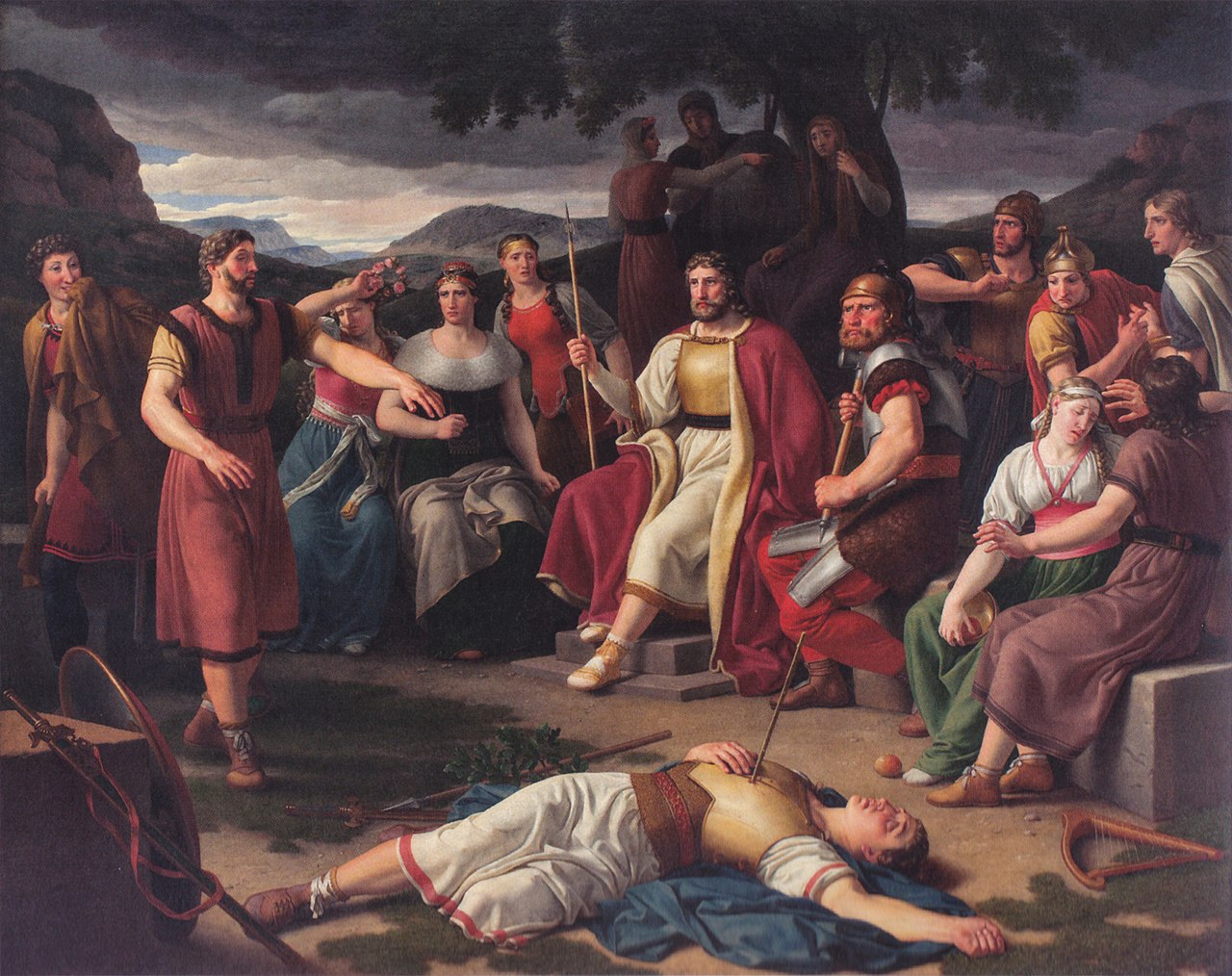Hodr (Höðr) is the Norse god of darkness. The twin brother of the beloved Baldr, Hodr is indirectly responsible for Baldr’s death.
In Norse mythology, the blind god Hodr is one of the more mysterious figures. The most pivotal moment in his life revolves around the death of his brother Baldr.
But the story of the Norse God Hodr isn’t as straightforward as it would appear. Amongst scholars of Norse mythology, there is talk about whether Hodr was literally a blind god or if his blindness was a metaphor for ignorance and naivety.
Because oral traditions by nature tend to change from generation to generation, it’s hard to know which version of Hodr’s life is truest to the original stories of the Viking Age.
What is Hodr god of?
The blind god Hodr is known as the god of night and darkness. Hodr is also the god of winter and the god of warriors.
The name Hodr means brave in Old English, while the Old Norse meaning is warrior. In Proto-Germanic languages, Hodr means battle.
In the Prose Edda and the Poetic Edda, Hodr is referred to by many names. Most of these names relate to his part in the death of Baldr.
In the poem Skáldskaparmál (Prose Edda), Hodr is called Slayer of Baldr, Companion of Hel, and Thrower of Mistletoe.
Hodr’s relations to other gods
Hodr is one of the lesser-known of the Æsir gods. Referred to primarily as the brother of Baldr, Hodr’s biggest influence on Norse mythology is his part in Baldr’s death. Hodr and Baldr (also Balder or Baldur) are the twin sons of Odin and Frigg.
Hodr is the half-brother of Æsir gods Thor, Tyr, and Bragi. Odin’s brothers Vili and Vé are Hodr’s uncles. Later, Odin conceives a child with the giantess Rindr, named Vali. Vali is the half-brother of all of Odin’s children, including Hodr.
Hodr’s part in brother Baldr’s death
In Norse mythology, Hodr is blamed for Baldr’s death, even though he is considered an unwilling participant.
While the gods of Asgard played games of throwing dangerous objects at the impenetrable Baldr, Hodr sat on the outskirts, feeling left out. Jealous of Baldr’s beauty and favor among the Æsir gods, the trickster god Loki conned Hodr into shooting the arrow that would end Baldr’s life.
The goddess Frigg loved his son Baldr so much that she forced every object and living being in existence to swear not to harm Baldr. As far as Frigg was concerned, the lowly mistletoe was too harmless to bother with. According to the Prose Edda and Poetic Edda accounts, this oversight would prove to be her biggest mistake.
After finding out about his weakness, Loki fashioned an arrow with a mistletoe tip. Helping the blind god Hodr aim at Baldr, Loki tricked Hodr into shooting his brother with the poison mistletoe. Alternate versions have Loki using a spear or even just a sharpened twig with mistletoe.

Hodr’s death
Hodr was killed by Baldr’s avenger, Vali. Vali is the son of Odin and the giantess Rindr, making him the half-brother of both Baldr and Hodr.
Vali was created by Odin and Rindr for the sole purpose of avenging Baldr’s death. Vali was said to have matured into adulthood in a single day when he went to Midgard to exact his revenge. He used an arrow to kill Hodr, mirroring the death of Baldr.
Even though Loki held more direct responsibility for Baldr’s death, Loki was not killed for his crimes. As punishment, Loki was banished to a cave, bound by the entrails of his son Narfi. Venom from snakes’ fangs dripped onto Loki from the ceiling, and his faithful wife Sigyn stood next to Loki, catching the poison in a bowl to protect her husband.
The Christian influence on Sturluson’s written account of Hodr
It’s well-established that historians of the 12th and 13th centuries were influenced by their disdain for all pagan religions. Historian Snorri Sturluson was not immune to his own bias, which may have influenced his description of Hodr in the Prose Edda.
In 1881 Norwegian philologist Sophus Bugge argued that the Christian stories about Jesus actually inspired Snorri Sturluson’s account of Baldr’s death in Gylfaginning. Bugge theorized that Hodr’s blindness represented naivety and ignorance, not literal blindness.
While many disagreed with Bugge, Swedish mythologist Viktor Rydberg also had doubts about Snorri Sturluson’s version of Hodr’s myth. Rydberg theorized that Sturluson had misunderstood the 10th-century poem Husdrapa, which described a mural in the home of Icelandic Chief Olafr Hoskuldsson.
The mural depicted the myth of Baldr’s death with Hodr’s eyes closed while Loki guided his arrow, symbolizing willful ignorance and not actual blindness.

Alternate Retelling of Hodr’s story in Gesta Danorum
In Gesta Danorum (History of the Danish), Saxo Grammaticus offers an alternate explanation for Baldr’s death.
Hodr and Baldr fought over their mutual love of the beautiful Nanna, daughter of King Gevarus. Because Baldr is a demi-god and Hodr is a mortal hero, it took several tries and one magic sword for Hodr to kill Baldr.
In Gesta Danorum, Hodr is known as Hotherus, and Baldr is known as Balderus. Both Balderus and Hotherus were in love with Nanna. It was said that Nanna preferred Balderus. As in Norse mythology, Nanna and Balderus had a child named Forseti.
Not to be deterred, Hotherus found Balderus’s weakness and fought for Nanna’s hand in marriage. Using a magical sword he got from the satyr of the woods known as Mimingus, Hotherus slays Balderus. In this version of the story, Balderus takes three days to die, and Hotherus wins the hand of his beloved Nanna.
Like the Norse Myths, Hotherus is killed by Balderus’s brother Bous, the son of Othinus and Rinda. Othinus and Rinda are the Danish names for Odin and Rindr. Bous is wounded in the battle and dies shortly after Hotherus does.

